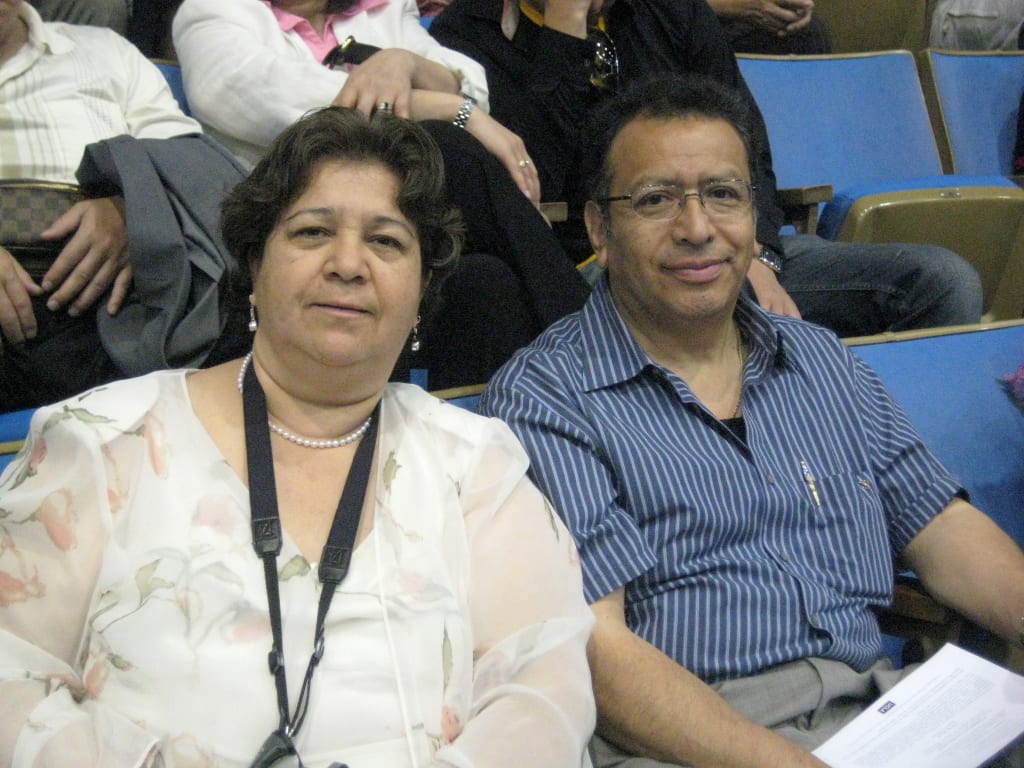My Papi
the Alien, the Human, the Miracle

“Did you know that I’m an alien?” my papi’s eyes twinkled mischievously, a slight smirk on his lips. He had just gotten off of work, and I had asked him to drive me to the mall so we could window shop and stroll around together. It was one of our things. As an auto body worker, he had been up since 5am, repairing and restoring car exteriors, a physically grueling job. Yet, he always mustered up the energy to fulfill the whims and wishes of an 11-year-old.
In response to his question, I scrunched up my face and giggled, imagining him with green skin instead of his olive complexion, bitter black eyes instead of his warm brown ones.
“It’s true,” he insisted. “I was born in Mexico, and that’s what they call us immigrants here – aliens!” His smirk broke out in a full smile as he laughed. “But I won’t be an alien no more once I become an American!”
Papi was studying to take the U.S. citizenship test, and during our car rides or any other spare time we had together, I would go through the list of 100 questions and quiz him. After months of preparation, he took the test and passed on his first try. Now he just needed to ace the upcoming naturalization interview. We all celebrated, elated that another member of our family would obtain citizenship soon. Mom had just become a U.S. citizen about a year prior. My eldest brother, Ulises, still needed to go through the process, though he had grown up in the U.S. since the age of two. My other older brother, Zeus, and I had been born and raised here.
The day of the naturalization interview arrived. I came back home from school to find my dad sitting on the couch, his head hung down, his lips set straight and the twinkle in his eye extinguished. He had misunderstood a question, and the interviewer had rejected his application. Months of preparation down the drain, just like that. The denial devastated my dad. He could have appealed the decision. But already discouraged, he didn’t bother. He would wait the required years and try again. My papi had never given up in his life – ever. He would bounce back. It would not be the first nor the last time.
* * * * *
"Dad needs a quadruple bypass," Ulises’ words glared through my laptop's screen, stinging me 6,000 miles away. At my apartment in Spain where I was teaching English, I had just decided to take a break from my LSAT (Law School Admissions Test) studies, the June 2012 exam looming a little over two months ahead of me. I talked to my dad over the phone before the surgery. He encouraged me to stay in Spain and finish my teaching program. “I’m gonna be there at the end of May to pick you up at the airport,” he asserted, his voice shaky but defiant. He then broke into sobs, and my mom had to end the call.
Two days later Ulises updated me, "Dad had a stroke during surgery and needs a craniectomy. Zeus and I think you should come home." In a hummingbird's heartbeat, I launched into plans for my return trip. Once home, I spent nights in the Intensive Care Unit. There he lay unconscious, breathing tube down his throat and half his skull removed to reduce swelling, his brain protected by only a few layers of cranial membranes and skin. My papi had never looked so vulnerable, so helpless. He was human after all. It suddenly became sharply apparent to me in a way I had never grasped before. Strange when it finally registers that your parents are actually people too, mere mortals like the rest of us.
Hour-long drives through L.A. traffic, from home to the hospital and back again, defined my family's days. Meanwhile, a severe infection required another surgery. Determined to take the LSAT in June, I continued to try to study. I quickly realized, though, that I did not have enough time to prepare sufficiently. Mission readjusted: October LSAT.
My dad came back home in late June, still immobile on his left side and missing part of his skull on the right. Between doctor's appointments, therapy sessions, and helping my mom at home, I rebooted my LSAT self-study schedule. A week before the October LSAT, my dad suffered a strong seizure and returned to the hospital for a few nights. A few days before the LSAT, I learned that my dad would undergo a cranioplasty on October 9 to replace his skull. The memory of my dad's constant emphasis on the importance of education throughout my childhood – due to his and my mom's lack of educational opportunities in Mexico – pushed me forward. My dad had often professed his pride in me – not only the first (and youngest) in my family to attend college, but also a first-generation high school student.
Papi could have been the first in the family to go to high school and beyond, though. Oh, he certainly had the drive, the will, the love of learning, not to mention the ingenuity and intelligence. But his circumstances nipped his potential in the bud. Before dropping out just shy of entering high school, my dad had tried everything in his power to prevent the inevitable. He began working for some extra pesos. And when he and his family still could not afford the inflating costs, he devised schemes to sneak into school, defying an increasingly strict principal. Papi called her the witch.
When the witch implemented a new school uniform jacket, out of budget for my dad’s impoverished family, Papi had his friend pass through the uniform inspection at the school’s entrance first, then come around and throw his jacket over the school fence to my dad, who then put it on and passed the uniform inspection himself. When the witch required students to buy new books, Papi shared books with his friend. Despite all his efforts, though, the barriers kept rising – students were prohibited from sharing school materials, expenses kept escalating – and my dad was finally forced to drop out.
* * * * *
After Trump got elected, I feared for my papi’s immigration status. Even though he had his green card, citizenship would provide more security. However, the stroke had left him permanently disabled. How could he possibly pass the test now? Although, he could thankfully still talk, his memory and cognitive abilities functioned at a fraction of their previous capacity. He was a shadow of his old self.
And yet, that twinkle still lingered in his eye, that old smirk still occasionally crossed his lips. His old self still sometimes shone through. He could do this.
I found out about a legal non-profit called CARECEN (Central American Resource Center) that was providing 100 days of free naturalization assistance services following Trump’s inauguration. I immediately told my parents about it and encouraged them to go. This time with the help of a legal team, Papi applied for his citizenship once more. Because of his disability, my dad received accommodations to take a shortened verbal test.
Just like when I was 11 years old, I would help my dad study by quizzing him. He amazingly retained much of the information. He only had trouble with the names of current elected officials. I breathed a bit easier, but not by much.
The day of the naturalization interview arrived. They would administer the verbal test simultaneously. Accompanied by a lawyer from CARECEN, he answered the interviewer’s questions. The lawyer interjected a few times, my mom later told me.
In the end, the interviewer shook my dad’s hand and congratulated him. He was finally a U.S. citizen!
* * * * *
My papi is a miracle. He has beaten the odds so many times. Medical staff at the hospital where he had his heart surgery even told him that he should be dead. “God must really love you,” they had said, shaking their heads.
It’s been 10 years since the stroke, 3 years since he received his citizenship. My papi talks about going for his GED now. He talks about walking and driving again.
About the Creator
Enjoyed the story? Support the Creator.
Subscribe for free to receive all their stories in your feed. You could also pledge your support or give them a one-off tip, letting them know you appreciate their work.
Reader insights
Outstanding
Excellent work. Looking forward to reading more!
Top insights
Compelling and original writing
Creative use of language & vocab
Easy to read and follow
Well-structured & engaging content
Excellent storytelling
Original narrative & well developed characters
Eye opening
Niche topic & fresh perspectives
Heartfelt and relatable
The story invoked strong personal emotions
Masterful proofreading
Zero grammar & spelling mistakes
On-point and relevant
Writing reflected the title & theme







Comments (3)
Beautiful story. Subscribed. Congratulations on the Runner-up win!!!
Congratulations!
What a beautiful story. ❤️ Papi perseveres for himself and his family.